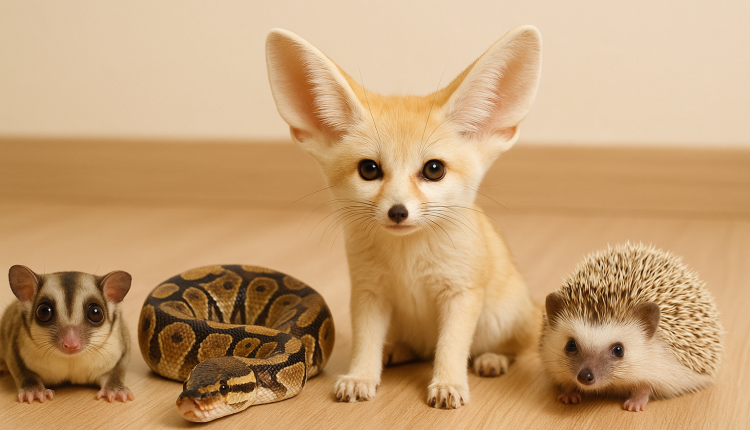The Surprising World of Exotic Pets: What You Should Know Before Bringing One Home
In recent years, exotic pets have moved from the fringe of pet ownership into mainstream conversations. Once considered the domain of collectors and wildlife enthusiasts, exotic animals such as sugar gliders, fennec foxes, and reptiles like bearded dragons and ball pythons are now making appearances in suburban homes across the globe. But while they may be fascinating and unique, keeping exotic animals requires far more than curiosity — it demands knowledge, commitment, and responsible stewardship.
What Makes a Pet “Exotic”?
The term “exotic pet” generally refers to any animal not commonly kept as a domestic companion, such as cats, dogs, or traditional farm animals. This can include amphibians, reptiles, certain birds, insects, and mammals native to other continents or specific ecosystems. Some exotic pets are small and relatively easy to care for, while others may grow large, have complex environmental needs, or carry risks to humans and native wildlife.
Popular Exotic Pets and Their Requirements
Let’s explore some of the most popular exotic pets and what makes them both appealing and challenging:
1. Sugar Gliders
These tiny marsupials are known for their endearing eyes and gliding ability. Native to Australia and New Guinea, sugar gliders are social animals that bond closely with their human caretakers. However, they require a lot of attention, a spacious vertical habitat for climbing and gliding, and a specialized diet that mimics their natural intake of nectar, fruits, and insects.
2. Ball Pythons
Among the most popular pet snakes, ball pythons are favored for their manageable size and typically docile temperament. They need a controlled environment with proper heating and humidity, as well as secure enclosures (snakes are escape artists!). Feeding is usually done with frozen-thawed rodents, and while not dangerous to humans, they still require respectful handling.
3. Hedgehogs
These spiny little creatures have gained a fan base due to their unique appearance and relatively quiet nature. African pygmy hedgehogs, in particular, are popular in the pet trade. They need a warm, draft-free enclosure, a running wheel for exercise, and a high-protein diet. Since hedgehogs are nocturnal, potential owners should be prepared for nighttime activity.
4. Fennec Foxes
With their oversized ears and playful behavior, fennec foxes are one of the most striking exotic pets. They are highly energetic, require a secure outdoor space to dig and run, and their nocturnal nature means they may be active — and noisy — at night. Additionally, they are not fully domesticated and can be unpredictable or destructive if not properly trained and enriched.
5. Tarantulas and Scorpions
Invertebrate enthusiasts often turn to species like the Chilean rose tarantula or the emperor scorpion. These creatures are low-maintenance in some ways, requiring small enclosures and infrequent feeding. However, they are delicate in others — stress, mishandling, or incorrect humidity can quickly become fatal. They are also not meant to be cuddled or frequently handled.
Legal and Ethical Considerations
Not all exotic pets are legal everywhere. State and local regulations often prohibit or restrict ownership of certain species due to ecological risk, public safety, or animal welfare concerns. Before acquiring any exotic animal, prospective owners must research local laws, obtain any necessary permits, and ensure that their future pet is sourced from ethical, captive-bred origins — not taken from the wild.
Ethically, one must consider the animal’s well-being. Can you provide a stimulating, species-appropriate environment? Will you have access to specialized veterinary care? Is this a lifelong commitment, or are you adopting an animal on a whim?
Environmental Impact and Conservation
There’s a growing debate about the impact of exotic pet ownership on conservation efforts. On one hand, captive breeding programs can reduce pressure on wild populations and raise awareness of endangered species. On the other hand, the exotic pet trade — particularly when fueled by illegal wildlife trafficking — can decimate wild populations and disrupt ecosystems.
For responsible pet owners, the best course is to choose animals bred in captivity and to support breeders and organizations with transparent, ethical practices.
Challenges of Veterinary Care
Many exotic pets require care from veterinarians who specialize in exotic or zoological medicine. This can be a challenge in rural or underserved areas. Routine care like check-ups, vaccinations (when applicable), or even emergency procedures may not be available without traveling long distances. The cost of care may also be significantly higher due to the specialized nature of treatment.
Long-Term Commitment
Unlike a goldfish or hamster, many exotic pets can live for decades. Parrots can live over 50 years. Tortoises may outlive their owners. Even small reptiles can live 10–20 years with proper care. Exotic pets often require specialized housing, diets, and enrichment — and their novelty can wear off if owners aren’t truly prepared for the responsibility.
Is an Exotic Pet Right for You?
Ask yourself the following questions before committing to an exotic animal:
- Do you have enough time and resources to care for this animal daily?
- Is there a qualified exotic vet nearby?
- Is the pet legal in your area?
- Are you prepared for the animal’s lifespan and unique needs?
- Do you have plans for the animal if your circumstances change?
If the answer to any of these is no, it may be best to wait or consider a different pet that suits your lifestyle more realistically.
Final Thoughts
Exotic pets can be deeply rewarding for the right person — someone who is passionate, informed, and committed to their care. They offer a glimpse into nature’s diversity and can form deep bonds with their caretakers. But the decision to bring one into your home should never be taken lightly. Education, preparation, and respect for the animal’s needs and origins are key to becoming a responsible exotic pet owner.
By making informed, ethical choices, you can help ensure that your exotic companion thrives — and that the ecosystems and species they represent are protected for generations to come.

